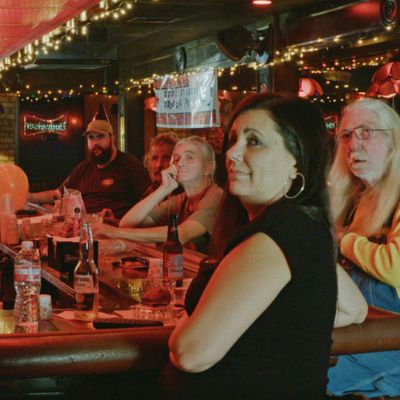
A few hours before the bar in Bloody Nose, Empty Pockets closes its doors forever, two of its patrons tussle on a couch like kittens. Peter is trying to get Michael, a bedraggled actor turned full-time alcoholic, up, though it’s unclear to what end. Michael doesn’t seem to have anywhere else to go — he’s passed out at the bar when the film begins, and he’s still there when it ends, not quite 24 hours later. As he sprawls there, in the place that’s closer to home than anywhere else where he might spend his nights, he’s suddenly seized by the need to give some advice to the tatted-up kid trying to wrestle him back into a standing position. “You need to get out of here while you’re still a musician,” he tells Peter urgently. “You’re still young, and you can still do something other than what I’ve done. There is nothing more boring than a guy who used to do stuff who doesn’t do stuff no more because he’s in a bar.”
Bloody Nose, Empty Pockets, a stunner of a fifth feature from brothers Bill and Turner Ross, will have you feeling that while Michael has a point in some ways, he’s entirely incorrect in others. There is nothing remotely boring about this film, a dive-bar elegy that creates a pang in the heart and a sympathetic answering one in the liver. It chronicles the last hurrah of Roaring 20’s, an unfussy institution whose devoted regulars troop in with party hats and balloons and a cake that says “This Place Sucked Anyways” — participating in a raucous wake for a bar that’s clearly important to most of the people who shuffle through its doors. At the same time, the movie’s utterly unsentimental about how a good portion of those people have been drinking themselves to death within the fairy-lit confines. The ebbs and flows of the boozy marathon — we’re given time markers on screen at 10:59 a.m., 1:39 p.m., and then 4:41 a.m. — include customers getting sloppy, and getting maudlin, and occasionally getting pugnacious and having to be shown the door by an unimpressed bartender who kindly but firmly offers to call the culprit a cab after eighty-sixing him.
As a film, it’s warm and beautiful without being sentimental about the temporary intimacy that alcohol can provide, creating bonds that can dissolve in the daylightlike haze but are no less legitimate in the moment for it. Adding to the sense of liminality is the fact that the bar in which the movie’s set does and doesn’t really exist. Roaring 20’s is an actual establishment in a suburb of New Orleans, where the filmmakers are based — but in the movie it’s located on the outskirts of Las Vegas, and in occasional shots of the outside you can see the Luxor in the distance through a rosy filter. The customers were all cast by the filmmakers, some of them actors and some of them friends and some of them just folks they met at other bars, all of them playing themselves, more or less. The Ross brothers are documentarians, but Bloody Nose, Empty Pockets is an unclassifiable hybrid creation. It’s artificially staged, from the grand-good-bye premise to the programming the cameras sometimes swing over to catch on the television, which varies from Jeopardy to Battleship Potemkin. But there’s no denying its emotional truth. The difference between people gathering organically at a bar and being cued to do so by filmmakers guiding the action starts to seem negligible after a few hours of unscripted drinking.
To try to figure out whether Michael is performing or speaking from the heart when he presents himself as a cautionary tale to Peter is to dive into the weeds of what authenticity even means in this context. When Bruce, a veteran with a poetically hangdog face, weeps about how mistreated he feels by his country, the tears seem born out of sincere feeling. But then what about the ones that roll down his face when he leaves at the end of the night, grieving a joint that never really was his to begin with? The Roaring 20’s of Bloody Nose, Empty Pockets may have only existed for the 18-hour shoot the movie’s mostly cut from, but during that stretch, it clearly did become an actual place — a genuine local watering hole where everyone knows everyone else’s name. Its own ephemerality serves as a reflection of the sentiment it’s trying to capture, the feelings of congeniality and connection that can build over a night and then be gone. There’s no living in that space, no matter how hard Michael tries to make it his haven, because the lights have to turn on sometime. As the poet said, you don’t have to go home, but you can’t stay here.


